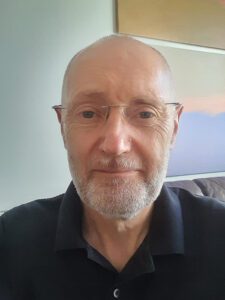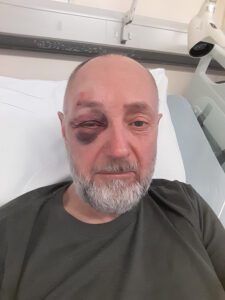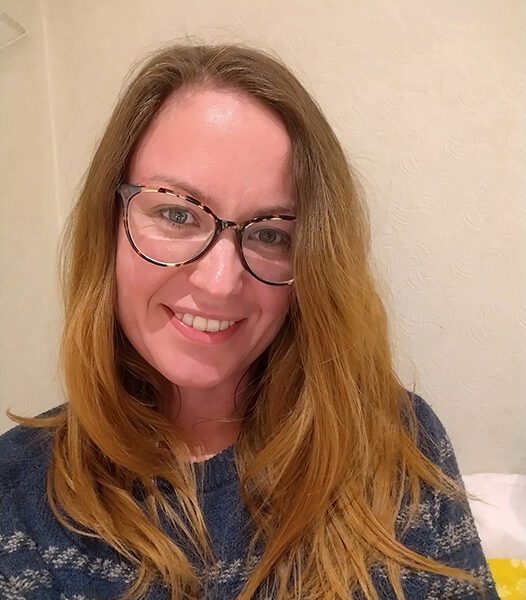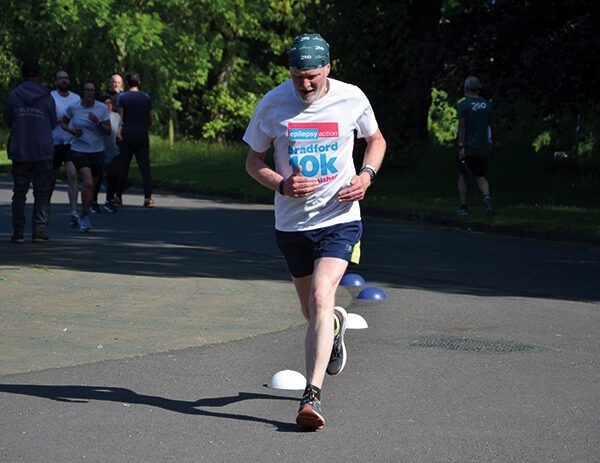 David had a breakdown on November 30th 2022, at the age of 59. He cried for the first time in his adult life, letting out years of suppressed pain that had built up over a lifetime of difficult moments; the death of his mum from cancer when he was 17, the breakdown of his marriage, being diagnosed with a brain tumour and developing epilepsy.
David had a breakdown on November 30th 2022, at the age of 59. He cried for the first time in his adult life, letting out years of suppressed pain that had built up over a lifetime of difficult moments; the death of his mum from cancer when he was 17, the breakdown of his marriage, being diagnosed with a brain tumour and developing epilepsy.
Throughout much of his life, David kept his grief on the inside. He felt that he didn’t have the security of a financially settled home life to “allow himself to break”. And as a young man, growing up in the 60s and 70s in Chester in an area which, in an interview with the Guardian, he calls “a tough place”, he felt he had to learn how to survive.
Since those early days, David continued through life bottling up more and more. One of the last blows that he took on the chin before his breakdown was around his health.
Developing epilepsy
In 2020, David began receiving radiotherapy for a tumour he had been diagnosed with the previous year. “I had no experience of epilepsy until the first week of radiotherapy in September 2020, when I suffered two sleep tonic-clonic seizures, waking up on both mornings at around 11:30am having bitten my tongue and urinated in my bed.
“After these first two seizures, I seemed to settle into a pattern of one seizure every month and that carried on for six months. But the seizures changed.”
While receiving treatment for his tumour, David continued to get on with things, like he’d done his whole life. “I had 30 sessions of radiotherapy in 2020 and managed to carry on working, in many respects aided by the COVID 19 pandemic and lockdown, which meant working from home became the norm.”
However, in 2022, the effects of inflammation caused by radiotherapy forced David to stop working. Over time, his epilepsy changed as well, leaving him to experience and deal with different seizures.
He explained: “My seizures have gone through phases. The first two were tonic-clonic seizures and after that, they became passing-out episodes, but without the tongue biting or wetting myself. On two occasions, I woke up on the floor.”
 David recounts these events in his book, Dave’s Story, saying he would wake up on the floor with no recollection of what had happened, once next to his computer while he’d been working, and once having broken his living room – thankfully safety glass – table that he’d been walking past.
David recounts these events in his book, Dave’s Story, saying he would wake up on the floor with no recollection of what had happened, once next to his computer while he’d been working, and once having broken his living room – thankfully safety glass – table that he’d been walking past.
“Then, after six months, they stopped. The medication seemed to be working and I enjoyed a sustained period without a seizure. But my other symptoms post radiotherapy worsened.
“Then, in late 2023, thinking I didn’t need the medication anymore, I stopped taking it. In January 2024, the seizures started again. I passed out whilst assembling a wardrobe, broke three ribs and suffered a severe black eye. Then, a month or so later, I woke up having bitten my tongue in my sleep.
“In April 2024, I had my last seizure – and my first one in public. I had an absence seizure in the supermarket whilst doing my weekly food shop. It took an hour before I came out of it and found myself in an ambulance outside the main entrance, having been guided there by the manager of the store.”
The perfect storm for a breakdown
David says developing epilepsy after a string of difficult and stressful events in his life was “like the perfect storm”. He separated from his wife of 30 years, and got on with his new life of socialising, working, dating and travelling (“I didn’t grieve, because I didn’t know how to grieve”).
“Then, slowly but steadily, my life closed in. First the tumour, then lockdown, then becoming too unwell to work.
“All of this finally led to the situation where I had to face the trauma that was bottled up inside me. Including the new trauma of epilepsy.”
When the pandemic caused a national lockdown, and David had to give up his job, he had time to himself to reflect. “Finally, the circumstances I needed to allow me to ‘breakdown’ safely were in place. I had the thinking time and my life was stable. And the breakdown happened.”
David was admitted to hospital in 2022, with his mental health having hit breaking point. In his book, he writes what was said in his hospital admission notes – “Working diagnosis: acute delusional disorder secondary to chronic anxiety and depression.”
David writes that during his breakdown, he believed he had died. He was able to speak frankly with his sisters about their mum’s death and cry with them, and be able to face all the other difficult moments he’d been keeping at arm’s length.
Following his breakdown, David feels like he’s had a ‘reset’ and is now able to cry freely and be a lot more in touch with how he’s feeling.
“In many respects, I am learning to live again and it feels very much like the beginning of the third stage of my life. I am starting again and having to learn how to do it.
“Learning to be ‘emotionally normal’ makes me more rounded, more grown up an
d mature as a person, and it illustrates how our capacity to grow carries on right through life. When the time and circumstances allow, personal growth kicks in.”
You can read more about David and his story online.
More articles







